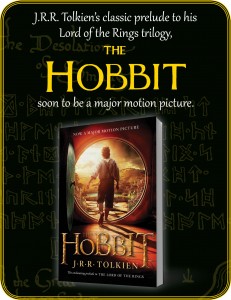One More Time—A Happy Hobbit Birthday!
I published the piece below two years ago on this date, my birthday. I’m happy to share it here again today, as I turn 60!
As this day, September 22, 2012, stretches toward midnight, it happens to have been my 58th birthday. Growing up, of course I always enjoyed this day, but as I prepared to turn 13 back in 1967, my appreciation of my own birthday had taken a new turn. For earlier that year I first read the work of J.R.R. Tolkien and discovered that all the key action in The Hobbit, and the first book of “The Lord of the Rings” trilogy, The Fellowship of the Ring, was triggered at the birthday parties of Bilbo Baggins,and his nephew Frodo Baggins. And for reasons unknown to me—and so far as I know, never analyzed in all the criticism on Tolkien and Middle Earth—the birthday of uncle and nephew Baggins was September 22. The sharing of my birthday with the brave and indefatigable hobbits was a source of great strength to me during my adolescence. When difficult times arose, I took comfort in the knowledge that I had some sort of kinship with the creative imaginings of such a great writer as Tolkien. His books have been with me at many junctures in my life. Seeing Tolkien’s hobbit protagonists at the center of his sagas made me believe I could be at the center of my own life narrative.
I’ve always liked the fact that the Jewish new year, Rosh Hashana, falls around roughly the same time as my birthday. This year it was just last week. I like that the new year is said to begin in autumn–counter-intuitively–just as life in nature is beginning to fade and die. It sobers one up a bit, reminding us all that we’re not here forever. I don’t need too much reminding of that fact, in as much as starting in my late 30s I lost my father, then in my 40s, two best friends from college—Rob Adams and Karl Petrovich—and in my 50s, my mom and then my brother, Joel. Still, it seems salutary to take note of the leaves falling just as we prepare the turn of another year, as well as the turn from summer into fall.
With Tolkien in mind, my observance of my own birthday this year got off to a good start yesterday when I saw in Shelf Awareness, the bookselling daily e-newsletter, that Tolkien’s US publisher is publishing a new edition of The Hobbit, tying in with Peter Jackson’s movie adaptation of “The Lord of the Rings” prequel, premiering December 14. When the movie opens in a few months, I’ll sort of feel as if it’s almost again, albeit out of season. Meantime, today’s been a good day, thanks to family, friends, and J.R.R. Tolkien.


